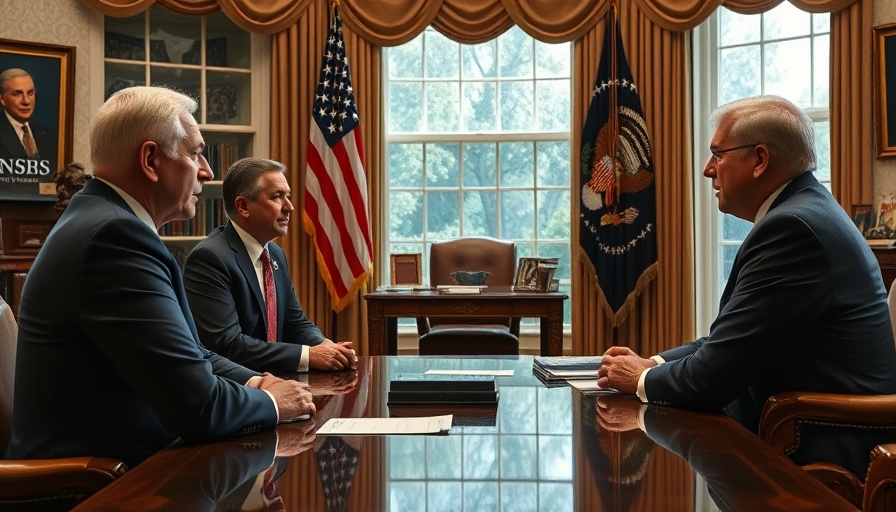
Concerns Looming Over the U.S. Economy
In the wake of President Trump’s newly imposed tariffs, the U.S. economy is increasingly becoming a topic of heated debate. Recent movements on Wall Street have raised red flags among investors, as all three major U.S. stock indexes saw significant losses. Treasury Secretary Scott Bessent, addressing these concerns, calmly reassured the nation by stating, “There doesn’t have to be a recession.” His remarks were made during an appearance on NBC's "Meet the Press," where he expressed unwavering confidence in the long-term economic prospects of the United States.
The Market's Volatility: A Temporary Setback?
Bessent remarked on the unpredictability of market reactions, highlighting that while day-to-day fluctuations may appear alarming, they do not necessarily reflect the health of the economy. He emphasized the importance of focusing on the long-term economic fundamentals that are essential for prosperity. The essence of his message was a stark contrast to the panic and speculation that often accompanies sharp declines in major stock indexes like the Dow Jones, which recently hit unprecedented lows. In his view, short-term setbacks are routine in financial markets, and investors must remain steadfast in their outlook.
Understanding Tariffs: Charts and Realities
The tariffs have stirred up much public debate. President Trump has framed them as a necessary move to reclaim economic power for American citizens, arguing that the previous administration's policies led to diminished industrial competitiveness. Various sectors of the economy now brace for the repercussions of the new tariffs, which include a baseline 10% levy on imported goods, aimed especially at countries like China and Canada that have responded with retaliatory measures.
However, the economic implications of tariffs are complex. Many economists argue that the price tag of such measures eventually falls on consumers. As Keith Maskus, an economics professor mentions, “It is pretty much always the domestic consumers that pay almost the full share these tariffs.” This insight points to an inherent risk of market disruptions, where consumers can expect price increases amidst these policy changes.
A History of Tariffs and Economic Policy
Historically, tariffs have been met with polarized views. On one end, advocates argue that sheltering local industries from foreign competition can spur job creation. Conversely, detractors contend that such actions often lead to trade wars, ultimately harming consumers and the global economy. The sentiment that “protectionism breeds isolationism” echoes throughout the discussions associated with tariffs.
In reference to historical precedents, one might look at the Smoot-Hawley Tariff Act of 1930, which significantly raised duties on hundreds of imports and is frequently cited as a contributing factor to the Great Depression. This serves as a cautionary reminder of potential adverse outcomes stemming from protectionist policies.
Future Economic Outlook: Balancing Hope and Caution
So, what does the future hold for the U.S. economy? Bessent's assurances suggest a belief in resilience, echoing the sentiment of building a more robust foundation for growth. Nevertheless, as the landscape continues evolving, economists warn that the outcome remains to be seen.
Looking forward, many analysts believe that while immediate economic indicators may appear troubling, focusing on consumer behavior, job creation, and manufacturing output will paint a more comprehensive picture of economic health. Tariffs may raise revenues in the short term, but their long-term sustainability and impact on consumer spending must be closely monitored.
Keeping Pulse on Economic Indicators
As citizens and stakeholders in the economic landscape, understanding key indicators like wage growth, unemployment rates, and consumer confidence becomes vital. These indicators serve as benchmarks for the health of the economy beyond stock market performance alone. Bessent's comments invite the public to adopt a more eclectic view of economic assessments rather than depending solely on momentary market dips.
In conclusion, Secretary Bessent’s remarks provide comfort amid economic uncertainty. While the near-term disruptions caused by tariffs raise valid concerns, it is imperative to cultivate an informed perspective that encompasses long-term economic health and acknowledges the complexity of tariffs. The onus rests on both policymakers and consumers alike to navigate these turbulent waters with caution, keen awareness, and optimism for sustained economic prosperity.
 Add Row
Add Row  Add
Add 




 Add Row
Add Row  Add
Add 








Write A Comment